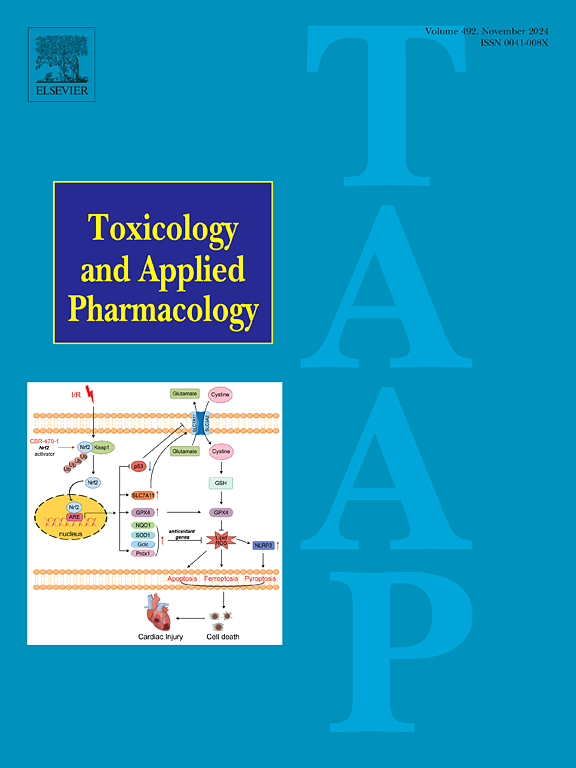Pectin-loaded ferulic acid nanoparticles: A potential therapeutic strategy for ulcerative colitis via modulation of the cGAS-STING pathway
IF 3.3
3区 医学
Q2 PHARMACOLOGY & PHARMACY
引用次数: 0
Abstract
Ulcerative colitis (UC) is a persistent intestinal disorder featuring periodic flare-ups of the colon's inner lining inflammation. Current therapeutic strategies, while effective in managing symptoms, are often limited by side effects and high costs. This study investigates the potential of pectin-loaded ferulic acid (PC-FA) nanoparticles as a novel therapeutic approach for UC, focusing on their ability to modulate the cGAS-STING pathway, a key mediator in the inflammation associated with UC. PC-FA nanoparticles were prepared and characterized for their physicochemical properties, antioxidant capacity, biocompatibility, and influence on the cGAS-STING pathway. In vitro experiments demonstrated that PC-FA nanoparticles enhanced the solubility and bioavailability of ferulic acid (FA), reduced oxidative stress, and protected colon epithelial cells from damage caused by the administration of dextran sulfate sodium (DSS). In vivo studies in a DSS-induced colitis mouse model showed that PC-FA nanoparticles mitigated weight reduction, lowered disease activity index (DAI) scores, and sustained colon length, and ameliorated histopathological changes. Additionally, PC-FA nanoparticles effectively targeted DNA damage and inhibited the cGAS-STING pathway, leading to a significant reduction in pro-inflammatory cytokines. Pharmacokinetic studies revealed rapid absorption of PC-FA in the bloodstream, with a predominant distribution in the intestines. The study concludes that PC-FA nanoparticles are a promising therapeutic strategy for UC, offering targeted drug delivery, enhanced bioavailability, and anti-inflammatory effects.

果胶负载阿威酸纳米颗粒:通过调节cGAS-STING途径治疗溃疡性结肠炎的潜在治疗策略。
溃疡性结肠炎(UC)是一种持续的肠道疾病,以结肠内层炎症的周期性发作为特征。目前的治疗策略虽然在控制症状方面有效,但往往受到副作用和高昂费用的限制。本研究探讨了果胶负载阿魏酸(PC-FA)纳米颗粒作为UC的新治疗方法的潜力,重点研究了它们调节cGAS-STING途径的能力,cGAS-STING途径是UC相关炎症的关键介质。制备了PC-FA纳米颗粒,并对其物理化学性质、抗氧化能力、生物相容性以及对cGAS-STING途径的影响进行了表征。体外实验表明,PC-FA纳米颗粒增强阿魏酸(FA)的溶解性和生物利用度,减少氧化应激,并保护结肠上皮细胞免受葡聚糖硫酸钠(DSS)引起的损伤。dss诱导结肠炎小鼠模型的体内研究表明,PC-FA纳米颗粒减轻了体重减轻,降低了疾病活动指数(DAI)评分,维持了结肠长度,并改善了组织病理学变化。此外,PC-FA纳米颗粒有效靶向DNA损伤并抑制cGAS-STING途径,导致促炎细胞因子显著减少。药代动力学研究显示PC-FA在血液中的快速吸收,主要分布在肠道中。该研究得出结论,PC-FA纳米颗粒是一种很有前景的UC治疗策略,具有靶向给药、增强生物利用度和抗炎作用。
本文章由计算机程序翻译,如有差异,请以英文原文为准。
求助全文
约1分钟内获得全文
求助全文
来源期刊
CiteScore
6.80
自引率
2.60%
发文量
309
审稿时长
32 days
期刊介绍:
Toxicology and Applied Pharmacology publishes original scientific research of relevance to animals or humans pertaining to the action of chemicals, drugs, or chemically-defined natural products.
Regular articles address mechanistic approaches to physiological, pharmacologic, biochemical, cellular, or molecular understanding of toxicologic/pathologic lesions and to methods used to describe these responses. Safety Science articles address outstanding state-of-the-art preclinical and human translational characterization of drug and chemical safety employing cutting-edge science. Highly significant Regulatory Safety Science articles will also be considered in this category. Papers concerned with alternatives to the use of experimental animals are encouraged.
Short articles report on high impact studies of broad interest to readers of TAAP that would benefit from rapid publication. These articles should contain no more than a combined total of four figures and tables. Authors should include in their cover letter the justification for consideration of their manuscript as a short article.

 求助内容:
求助内容: 应助结果提醒方式:
应助结果提醒方式:


